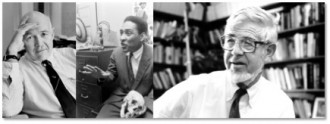
With the academic year wrapping up and Contexts winding down, I find myself thinking ahead to the project (on race, religion, and diversity in America) I said would be the basis of my sabbatical work in the coming year–what it will be, who it will be for, and how it will contribute to the discipline. So I was obviously intrigued when I heard that Sudhir Venkatesh, author of the sociological best seller Gang Leader for a Day and a Contexts board member, had written a review for Slate of Elijah Anderson’s The Cosmopolitan Canopy: Race and Civility in Everyday Life.
The review didn’t necessarily inspire me to read Anderson’s book. In Venkatesh’s description, the bulk of the writing and analysis (including the title itself) conveys an overly optimistic and superficial vision of race and race relations in America, one that fails to accord with common experience, other social scientific research and writing, or Anderson’s own interviews with African Americans who work in the corporate sector. (A “vein of distrust of whites and suspicion about racial progress” is revealed by these interviews, according to Venkatesh, which raises fundamental questions about the “celebratory canopy.”)
I can’t say that I agree (or disagree) as I haven’t yet read the book itself. However, Venkatesh’s review did get me thinking a lot about the state of sociology. Venkatesh frames the shortcomings of Cosmopolitan Canopy as “a symptom of the field… which is confused about its direction.”
Sociology, Venkatesh writes, “once gravitated to the most pressing problems,” took us into otherwise “foreign, impenetrable worlds,” and “examine[d] cherished beliefs and institutions… stereotypes and misguided policies.” In previous generations, “data-carrying” sociologists like St. Clair Drake, Herbert Gans, and James Coleman were some of America’s “most influential truth-tellers,” “important cogs in the civic wheel” who helped “end school segregation, ensure fair housing policies, [and] promote public sector accountability.” No more. Venkatesh worries that the “great American intellectual tradition” that is sociology is “weathering a troubled transition.”
Venkatesh may be accused of being an alarmist, and he is definitely more nationalist about sociology’s origins than I, but he has a point. Americans are, more than ever, in need of sociological research and analysis, but they are less and less likely to find it.
Thinking about what this all implies for me and my work on diversity in the U.S., I have been musing about the biggest challenges and deepest concerns of the nation as a whole. To Venkatesh’s list, I would add that sociology has not only data and information to contribute to public discussion and debate, but also broad, big-thinking perspective and synthesis—the kind of critical, creative work that Robert Bellah and his colleagues called “public philosophy” in Habits of the Heart, that classic sociological study of American culture and character. How this will help refine my next work remains to be seen, but as an aspirational impulse, I find it invigorating and hope others will too.

Comments